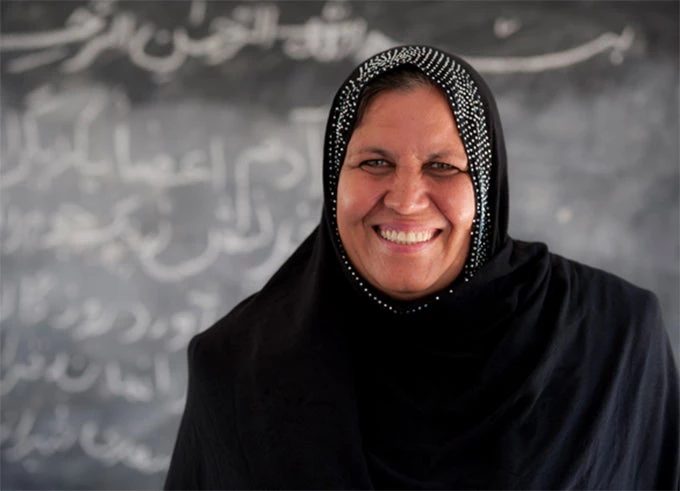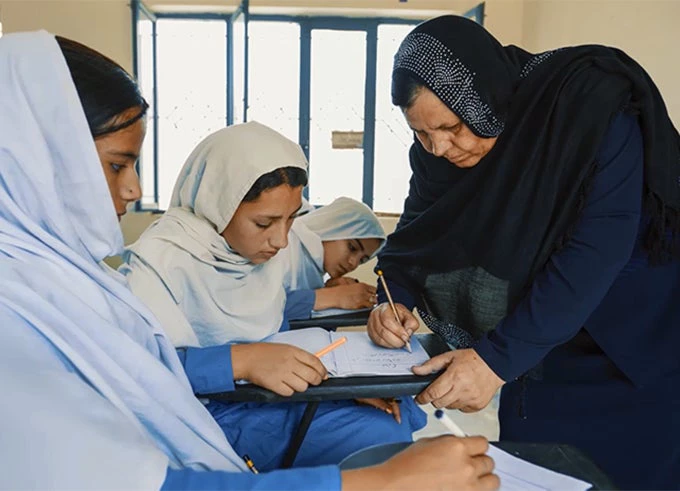
Aqeela Asifi is the 2015 winner of UNHCR's Nansen Refugee Award, recognized for her indefatigable efforts to educate Afghan girl refugees. She was a guest panelist at the "Managing Displaced Populations—Lessons From Pakistan" discussion with President Jim Yong Kim during his two day visit to Pakistan last week.
Her car broke down during her long journey to Islamabad from Kot Chandana, a refugee village where she lives in the south-eastern Punjab province of Pakistan.
Tired she may be, and notwithstanding a panel discussion on the Afghan refugee situation still ahead of her, she has a story to tell and nothing will stop her.
Her quiet, almost shy demeanor belies her fierce determination: Aqeela Asifi is a refugee, teacher, champion of girl’s education, an inspiration to thousands of her students, and a 2015 winner of UNHCR’s Nansen Refugee Award.
Her story is one of resilience against all odds.
Like hundreds of thousands of other Afghans, she was forced to flee Afghanistan in 1992 when civil war broke out in the country. She left everything behind: her family, her house, and a job as a teacher in Kabul, and ended up in Kot Chandana, a village in Pakistan, which then hosted nearly 180,000 other refugees. By the early 1990s, more than three million exiled Afghans had crossed Pakistan’s border, putting additional pressure on the country’s infrastructure and social services, notably health services and schools. What Asifi witnessed was a complete lack of learning facilities and opportunities for girls in her newfound community. “ When I started living at a refugee camp I saw girls’ education was the most neglected area,” she says. “ Girls were not even aware of education and its importance in their lives. They didn’t know anything about books, pencils, and it was then when I realized that this community needed my help.”
Asifi started a school under a makeshift tent in the sweltering summer heat, with no cool drinking water, fans or electricity. Unfazed by the lack of resources, parents’ reluctance to let their girls learn, and the community’s strong conservative biases against female education, Asifi bought stationary and pencils with her own money and spent three years teaching 75 girls up to third grade . “My objective was to provide education to these neglected girls who were poor and in need of assistance, says Asifi. “Many of them were not allowed by their families to attend schools for cultural reasons. But I continued my efforts until I achieved my goal. Those girls for whom education was a distant dream are now studying.”
Her schools have grown over the past 23 years and permanent buildings have replaced the original tents. Asifi’s dedication has helped guide more than 1,000 girl students, refugees and Pakistanis alike, through to the eighth grade – with each student receiving a nationally-endorsed certificate confirming their achievement.

Asifi is proud of her student graduates. One of her former pupils returned to Afghanistan years ago and started a school, replicating Asifi’s model of a home-based girls’ school. Her school in Kunduz, Afghanistan has been functional for more than 13 years and is now educating hundreds of girls. Another former student is now a doctor; another is working in computer science. “ Hundreds of my students are living successful lives,” says Asifi, “which is a source of great pride for me.”
Aqeela Asifi: A Champion of Education for Afghan Girl Refugees


Join the Conversation